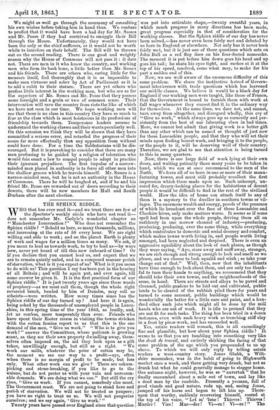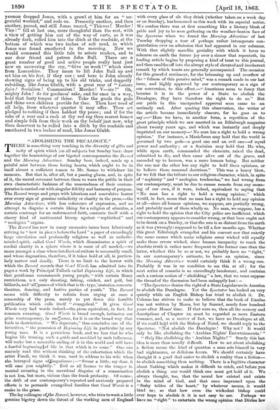THE SPHINX RIDDLE.
WHO that has ever read it—and we trust there are few of the Spectator's weekly circle who have not read it— does not remember Mr. Carlyle's wonderful chapter on " Manchester Insurrection ?" Who does not remember the Sphinx riddle? "Behold us here, so many thousands, millions, and increasing at the rate of 50 every hour. We are right willing and able to work; and on the planet Earth is plenty of work and wages for a million times as many. We ask, if you mean to lead us towards work, to try to lead us—by ways new, never yet heard of till this new unheard-of time ? Or if you declare that you cannot lead us, and expect that we are to remain quietly unled, and in a composed manner perish of starvation, what is it you expect of us? What is it you mean to do with us? This question I say has been put in the hearing of all Britain ; and will be again put, and ever again, till some answer be given it. It is the first practical form of our Sphinx riddle." It is just twenty years ago since these words of prophecy—as we must call them, though the whole right reverend bench, headed by him of Dunelm, may call us atheists—were written. How many times since has the sphinx riddle of our day turned up ? And here it is again, being asked by the thousands of unemployed people in Lanca- shire, in this spring time of the year 1863, as loudly, and, let us confess, more temperately than ever. Friends who have spent their Easter recess in visiting the towns stricken with the cotton famine report to us that this is the one -demand of the men, " Give us work." " Who is to give you work?" answer the Committees, whose patience. is growing scant, as they see their own property dwindling away, them- selves often imposed on, the aid they look upon as a gift taken, unwillingly enough, but still as a right. " We work our mills, whatever the price of cotton may be, the moment we see our way to a profit—aye, often when there is no margin of profit to be made, but loss only. What other work can we give ? There aro oakum- picking and stone-breaking, if you like to go to the unions, but do not pester us with your vain and unreason- able demands. We are doing what we can." But still the cry rises, " Give us work. If you cannot, somebody else must. The Government must. We are not going to stand here and perish of starvation. We will not be treated as paupers; you have no right to treat us so. We will not pauperize ourselves ; and we say again, Give us work.' "
Twenty years have passed over England since that question was put into articulate shape,—twenty eventful years, in which much progress in many directions has been made, great progress especially in that of consideration for the working classes. But the Sphinx riddle of our day has never been solved,—has never even been fairly met and debated by us here in England or elsewhere. Not only has it never been fairly met, but it is just one of those questions which acts on John Bull as a red flag does on his four-footed namesake. The moment it is put before him down goes his head and up goes his tail ; he shuts his eyes tight, and rushes at it at the top of his speed, resolved, come what may, to make for his part a sudden end of this.
Now, we arc well aware of the enormous difficulty of this same problem. We share the instinctive hatred of Govern- ment interference with trade questions which has leavened our middle classes. We believe it would be a black day for England if our working men were taught, like those of France, that the Government is bound to furnish them with work at full wages whenever they cannot find it in the ordinary way for themselves. At the same time, we dare not, and cannot, turn away from altogether, and disregard wholly, this cry of "Give us work," which always goes up so earnestly and per- sistently from the best of our labouring class in bad times. More, we cannot but admit that giving work is a better gift than any other which can be named or thought of just now for these Lancashire people, and that they who will set their minds upon finding honest work, and bringing it to the people, or the people to it, will be deserving well of their country. Therefore, we are glad to ace that attention is being turned to this in many quarters.
Now, there is one large field of work lying at their own doors, and waiting patiently these many years to be taken in hand, which we can at once recommend to the men of the North. We have all of us been in one or more of their manu- facturing towns, and must still probably recollect the first impression which these made upon us. Such unkempt, un- eared for, dreary-looking places for the habitations of decent people it would be difficult to find in the rest of the civilized world. How the idea of home can attach itself to any of them is a mystery to the dweller in southern towns or vil- lages. The enormous wealth and energy, proofs of the presence of which lie broadcast over the face of these Lancashire and Cheshire hives, only make matters worse. It seems as if some spell had been upon the whole people, driving them all on ruthlessly in one narrow channel of industry—producing, producing, producing, ever the same thing, while everything which contributes to domestic and social decency and comfort, which makes towns worth living in, and people worth living amongst, had been neglected and despised. There is even an aggressive squalidity about the look of such places, as though they were saying, "Aye, stare away and sniff away, stranger, we are rich enough and strong enough to look and smell as we please, and we choose to look squalid and stink ; so take your change out of that." Well, then, now that the inhabitants have time enough to look about them, and are only too thank- ful to turn their hands to anything, we recommend that they should take their own towns, and the neighbourhoods of the same, in hand. There are streets and alleys to be paved and cleansed, public gardens to be laid out and cultivated, public lands to be cleared of the rubbish piled there for years and turned to some account, public buildings which would be wonderfully the better for a little care and paint, and,a hun- dred other such jobs which might all be done by the mill hands who are out of work. It is idle to pretend that they are not fit for such tasks. The thing has been tried in a dozen instances, even with such heavy work as trenching stiff clay in a frost by piece-work, and has succeeded well. Yes, astute readers will remark, this is all exceedingly find and plausible, but how about your Sphinx riddle ? It seems to us that you are tumblipg into something very like
the droll de travail, and entirely shirking the facing of that
same problem of the age which you propounded to us up above. To which we will only reply by telling astute
readers a west-country story. Jonas Glubb, a Wilt- shire moonraker, was in the habit of going to Highworth market once a week, and there getting very drunk, but not so
drunk but what he could generally manage to stagger home.
One autumn night, however, he was so " auvertuk " that he finally succumbed about a mile out of town, and lay like
a dead man by the roadside. Presently a yeoman, full of good viands and good nature, rode up, and, seeing Jonas, jumped off his horse and began to lift him up. There-
upon that worthy, suddenly recovering himself, roared at the top of his voice, " Let m"lone Thieves! Thieves ! Murder ! Vire ! Mur—der ! Vi—re I Vi—re ! " The yeoman dropped Jonas, with a growl at him for an " un- grateful wosbird," and rode on. Presently another, and then another, passed, and still Jonas roared, " Thieves ! Murder ! Vire ! " till at last one, more thoughtful than the rest, with a view of getting him out of the way of carts, as it was already dark, rolled him into the ditch at the roadside, at the bottom of which was two inches of soft mud, in which Jonas was found smothered in the morning. Now we would commend this little tale to astute readers, and to our dear friend and patron John Bull. There are a great number of good and active people really bent just now on answering the cry, " Give us work ! " which rises from Lancashire. They mean to lift John Bull up and set him on his feet, if they can ; and here is John already showing signs of being up to his old tricks, and doggedly subsiding, like Jonas Glubb, with a great roar of "Laissez faire ! Socialism ! Communism ! Murder ! V—ire !" Oh, mighty John ! do for goodness' sake, and for once in a way, hold that lusty tongue of thine. Take the goods the gods and thine own children provide for thee. Thou bast need of all help, from whatever quarter it may offer. Thou art pledged to nothing if thou holdest thy peace ; and if for the sake of a roar and a rush at thy red rag thou scarest honest and simple folk from their work on thy behalf just now, why thou deservest to be rolled into a ditch by the roadside and smothered in two inches of mud, like Jonas Glubb.































 Previous page
Previous page